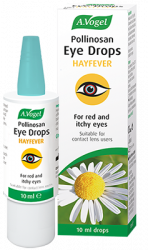Fight nature with nature
Suffer from hayfever and find enjoying the outdoors a misery during the spring and summer months? At the beginning of the season, usually around April, hayfever sufferers can start to use natural healing methods to build their immunity and keep them sneeze-free.
Hayfever symptoms are caused by histamine levels in the body rising as they react to pollen. Although nature is the cause of most hayfever symptoms, it can also be a sufferer’s best defense to help keep the reaction under control. Here are some things that will help prepare your body by providing a natural source of antihistamine:
Be full of C – Vitamin C is a natural antihistamine, so take small doses regularly throughout the day. You can also step up your intake of foods containing natural sources of vitamin C to include fresh fruit such as apples, kiwi fruit, raspberries, blueberries and citrus fruit, as well as peppers, tomatoes and green, leafy vegetables.
A+ your food – Eat lots of foods containing vitamin A as this vitamin helps keep mucous membranes healthy. Foods such as carrots, tomatoes, dried apricots, sweet potatoes, mangoes, spinach and watercress are full of beta-carotene from which your body makes vitamin A.
Have a cuppa – Avoid or reduce your intake of tea, coffee and other caffeine products, as these trigger histamine release. Instead, drink plenty of herbal teas, such as Chamomile tea and Ginger tea both of which are reputed to relieve hay fever symptoms. Green tea also strengthens the immune system and acts as a natural antihistamine, whilst Peppermint tea relieves nasal and sinus congestion.
Get nettled – Nettles can be effective in reducing histamine-type reactions, including frequent ‘prickly heat’ type symptoms. You can drink Nettle tea or try a tincture of urtica (nettle) leaves and root.
Herbal Helpers – A useful herb to take if symptoms affect the eyes and nose is Luffa. It helps relieve blocked and running noses, as well as watery and itchy eyes and a tickly throat. It isn’t contraindicated with other medication including other hayfever medication and is available as a nasal spray, as a tincture and also in tablet form. Devil’s Claw tincture can offer relief as well, reducing inflammation in the congested tissues, and balancing an overactive immune response.
Now you know what to take, how about what you should avoid?
As stated above, caffeine is a big trigger of hayfever symptoms, as is alcohol, refined sugar and dairy products, so try to reduce your intake of these as much as possible. Avoid smoky atmospheres, wearing too much perfume and using household cleaning products such as air fresheners all of which can contribute to aggravating your hayfever symptoms further.




 Looking for relief of red and itchy eyes due to hayfever?
Looking for relief of red and itchy eyes due to hayfever?

